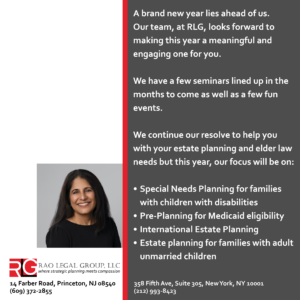
Everyone has heard of Wills and Trusts. Most articles written on these topics, however, often presume that everyone knows the basics of these important documents. But, in reality, many of us don’t – and with good reason – as they’re rooted in complicated, centuries-old law.
Let’s face it, if you’re not an estate planning attorney, these concepts tend to remain merely that – concepts. So, if you’re “fuzzy” about Wills and Trusts, know that you are not alone. After we show you the difference between all these documents, we’ll let you decide why you think one may be better off than the other for your particular situation.
Wills vs. Trusts: Defined
Let’s take a minute and define both “Will” and “Trust”:
Will. A Will is a written document that is signed and witnessed. A Will is considered a “death” document as it only goes into effect when you die. A Will provides for the distribution of assets owned by you, but not assets directed to others through beneficiary designations (e.g. life insurance or retirement benefits). It permits you to revoke or amend your instructions during your lifetime, tends to cost less than a Trust on the outset but costs more to settle during court proceedings after death. Example – to probate a 50-page Will, you are looking at a cost of $300 just for the filing fee plus more for the Executor Short certificate etc.
Trust. There are 2 types of trusts – (1) A Testamentary Trust; (2) An inter-vivos (or living) Trust. Inter-vivos trust can either be Revocable or Irrevocable.
- Testamentary trusts are created under a Will or a Revocable Living Trust and assets pass into such trusts only after the death of a Testator. That means, in order for these testamentary trusts to become effective, death needs to occur. Example: My Will states that upon my death my minor child who is 17 now shall inherit my assets at age 35. This means that a testamentary trust has been created under my Will so that if my death occurs before my child turns 35, the assets passing from my estate will go into a trust until my child turns 35.
- Inter-vivos or living trusts are legal documents, signed and either witnessed or notarized (or both) effective during your lifetime, during any period of disability, and after death. However, in order to be effective, either trust needs to be funded with your assets. They are of two types – revocable living trust or irrevocable living trust.
Revocable Living Trust (RLT). RLTs are nothing more than Will substitutes and form an important part of an individual’s foundational estate plan. They become effective immediately upon execution and remain effective during your lifetime until terminated. Just like Wills, they are completely changeable or modifiable during lifetime and minor changes can be added on by restating the original or including amendments. Upon death, RLTs function just like Wills by providing for the distribution of your assets to your ultimate beneficiaries. It avoids probate if fully funded, provides for a successor trustee upon your death or incapacity, allows for the management of your property – even if you’re incapacitated, can address appointing disability guardians during your lifetime for any minor beneficiaries of your estate and permit you to revoke or amend your wishes during your lifetime. It does cost more than a simple Will on the outset but much less upon administration, since there is no probate and costly delays are avoided. If you have property in another states, putting these properties into an RLT will avoid ancillary probate in all these states. Finally, in NJ, no Inheritance Tax lien is imposed on any of the assets inside the RLT – your estate may still be subject to taxes but there is no “freezing” of the any bank accounts or other probate assets while the estate is waiting for the waivers to be issued by the NJ Tax Branch.
Irrevocable Living Trusts. These trusts, as the name suggests, are set up during an individual’s lifetime but are irrevocable. When established, the Grantor (the person setting up the trust) transfers either by sale or gift, assets into this trust and completely gives up all dominion and control over the assets in the trust. The appointed Trustees now “own” the assets in the trust and manage the assets on behalf of the beneficiaries. These trusts are set up primarily to save on estate taxes as the assets in the trust are not included in the Grantor’s estate upon death, provides creditor protection both to the Grantor as well as to the beneficiaries and depending on how the trust provisions are drafted, the assets may avoid passing into the estates of the individual beneficiaries as well. In the Elder Law area, irrevocable living trusts may also be established as part of Medicaid planning to get individuals eligible for Medicaid. No matter which trust structure is utilized, irrevocable living trusts are sophisticated planning techniques that are established as part of an individual or married couple’s advanced planning.
Probate Process: Key Element in Deciding Between a Will and Revocable Living Trust
A key element in deciding between a Will and a Revocable Trust (your foundational plan) is understanding the probate process. “Probate” – which literally means “proving” – refers to the process wherein a decedent’s Last Will & Testament must be authenticated, outstanding legitimate debts paid, and assets transferred to the beneficiaries. The downside is that probate can take a long time – even years – it’s expensive in many places and the entire process is completely public, meaning your nosey neighbor Nancy and evil predator Paul both know exactly who got what and how to contact them. Additionally, as explained previously, in New Jersey, due to the inheritance tax structure, assets passing through probate will have an immediate lien imposed until waivers are obtained.
- Probate Guaranteed with a Will.If you use a Will as your primary estate planning tool, you own property in your individual name, or property is made payable to your estate, probate is guaranteed.
- Probate Avoided with a Revocable Living Trust.If you use a fully-funded Revocable Living Trust as your estate planning tool, probate is avoided – saving your family time and money.
Consult an attorney who specializes in estate planning & elder law to see whether trust planning is necessary for you and whether they will help in fulfilling your overall estate planning goals. Trusts may not be necessary in every situation but it is important to understand if there may be ways in which your specific estate plan may benefit from them!

